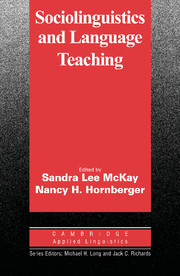Series editors' preface
Published online by Cambridge University Press: 22 July 2009
Summary
While there are a number of useful introductions to sociolinguistics, this book is unique in that it presents a coherent overview of the field of sociolinguistics for second language teachers, focusing in particular on issues likely to be of interest to language teachers and others interested in the educational implications of sociolinguistic research. The editors have employed a useful framework to elucidate the different levels of interaction that are relevant in examining social dimensions of language and language learning, one which contrasts macro and micro dimensions of language use in contexts which range from international to national, community, interpersonal, and personal.
Throughout the book, the contributors seek to broaden our understanding of how second language teaching and learning is related to a broad range of factors including societal, political, cultural, psychological, and interpersonal issues. These are shown to influence our conception of language, attitudes toward languages and their users, notions of standards, appropriacy and politeness, and motivation to learn languages, as well as the choices we make when we communicate with different people. Each chapter focuses on one important aspect of sociolinguistic inquiry, examining the assumptions behind a particular approach, the research methods it makes use of, and the findings that have emerged from it, and then explores implications for second language teaching.
Information
- Type
- Chapter
- Information
- Sociolinguistics and Language Teaching , pp. viiiPublisher: Cambridge University PressPrint publication year: 1995
